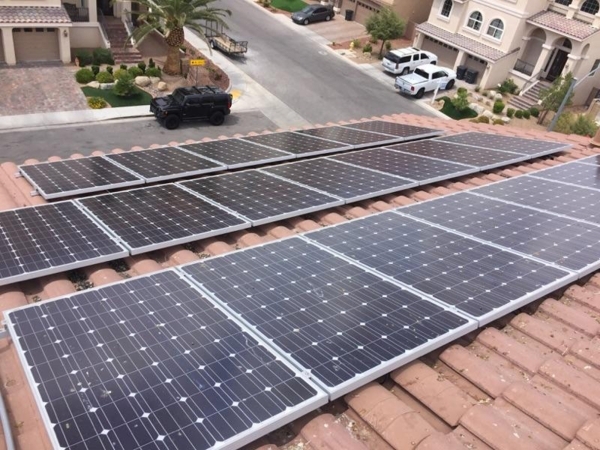Proposed extension of tax credit for rooftop solar praised

CARSON CITY — A rooftop-solar official on Wednesday praised a proposed extension of a five-year tax credit for residential solar installations awaiting action in Congress but remained concerned that a pending decision in Nevada on a new net metering tariff could doom the industry here.
The extension of the tax credit is included in an omnibus spending bill that is expected to see a final vote in Congress by the end of the week.
But the industry is still awaiting a decision by state regulators on the new tariff. A vote by the Nevada Public Utilities Commission is expected Tuesday. A draft order outlining the proposed tariff could be posted on the PUC website as early as Friday. That draft order could be modified, and other proposals could also be submitted by members of the commission.
Bryan Miller, senior vice president of public policy and power markets at Sunrun and president of The Alliance for Solar Choice, said the extension of the tax credit is due in large part to the work by Nevada Sens. Harry Reid and Dean Heller.
“The key bricks in the foundation for solar are the Investment Tax Credit (ITC) and stable net metering policies,” he said. “If politicians in Nevada or any other state take away either brick, the foundation crumbles. We urge Congress to finalize the five-year ITC extension promptly.”
But in a phone interview, Miller said Nevada’s 6,000 solar jobs remain at risk if the PUC adopts NV Energy’s proposed net metering tariff that would reduce the financial benefits of installing a residential rooftop solar system. Net metering allows homeowners with solar panels to receive a credit for any excess energy they generate.
NV Energy says the current rate of about 11.6 cents per kilowatt hour in credits is too high and requires a subsidy from nonsolar customers. The new proposed tariff would provide a credit of about 5.5 cents per kilowatt hour.
The state Bureau of Consumer Protection, which helped initiate a move to create a separate rate structure for net metering customers last year, has testified that only minor changes to the net metering tariff, if any, are needed at this time.
Critics of the NV Energy proposal argue it is designed to eliminate competition. NV Energy is owned by Berkshire Hathaway whose CEO is Warren Buffett.
The tax credit is now set to expire at the end of 2016 without the extension. The extension if approved would continue a 30 percent credit on the cost of a system through 2019. The credit would drop to 26 percent in 2020 and 22 percent in 2021. It would remain at 10 percent thereafter.
Miller said it would be a shame if the PUC adopted NV Energy’s new proposed tariff, which he called “blunt, solar-killing taxes.”
The best option would be to wait until NV Energy files its next general rate cases to assess what if any changes to the net metering tariff are needed, he said. If the commission does not act by the end of the year the existing rules would stay in place, he said.
A new three-year rate case was approved by the PUC for Nevada Power, part of NV Energy, in 2014. It took effect on Jan. 1 of this year. A new rate case won’t be filed until 2017 to take effect in 2018.
If the tax credit extension is approved and NV Energy’s tariff is approved, the bipartisan work of Reid and Heller won’t benefit Nevada residents, Miller said.
“It would be such a shame if Brian Sandoval’s commission undid the work that Senators Heller and Reid are on the verge of achieving for all Nevadans,” he said.
Contact Sean Whaley at swhaley@reviewjournal.com or 775-687-3900. Find on Twitter: @seanw801












